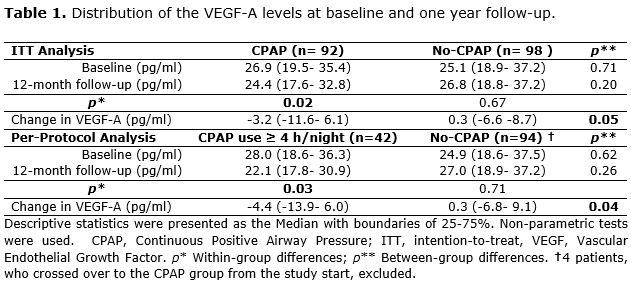Abstract
Background: Increased levels of Vascular Endothelial Growth Factor-A (VEGF-A) are associated with obstructive sleep apnoea (OSA). While VEGF-A is an important mediator of vascular repair in response to local hypoxemia, its overexpression in response to generalized hypoxemia may contribute to vascular disease. It is unclear whether continuous positive airway pressure (CPAP) treatment influences VEGF-A levels in patients with coronary artery disease (CAD) and OSA.
Objectives: To evaluate whether CPAP therapy would reduce VEGF-A after 1 year in a revascularized CAD cohort.
Methods: OSA patients from the RICCADSA cohort with an AHI ?15/h and Epworth Sleepiness Scale <10 were randomized to CPAP (n=92) or no-CPAP (n=98). Blood samples were obtained at baseline and 1 year follow-up. VEGF-A was measured by immunoassay (Luminex).
Results: Mean CPAP adherence was 3.2±2.8 h/night. CPAP reduced VEGF-A levels compared with controls (Table 1). In a linear regression analysis, allocation to CPAP was associated with the magnitude of change in VEGF-A after adjusting for age, sex, BMI, and baseline VEGF-A (standardized ?=0.05 [95%CI, 0.001-0.105], p= 0.047). These changes were greater in patients using CPAP?4 h/night.
Conclusions: CPAP reduces VEGF-A levels in OSA patients after coronary revascularization. The implication of this change for cardiovascular health is unknown.
